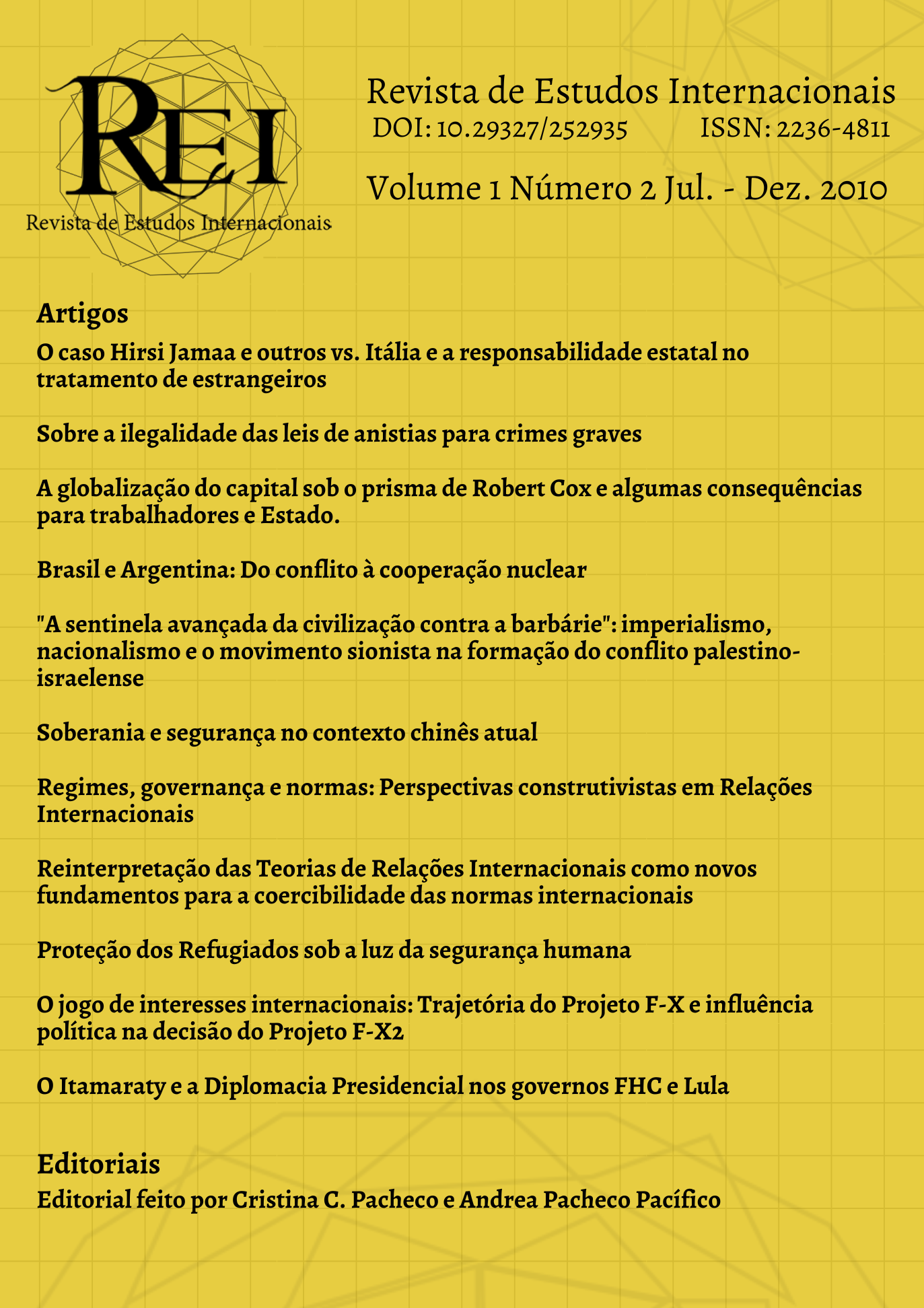Regimes, governança e normas: Perspectivas construtivistas em Relações Internacionais
Palavras-chave:
Regimes internacionais, governança, normas, ConstrutivismoResumo
A partir dos anos 1970, floresceram importantes reflexões sobre o gerenciamento do sistema internacional. Com efeito, as idéias de interdependência e regimes internacionais provocaram uma virada na produção acadêmica da área das Relações Internacionais. Com os anos, globalização e governança se tornaram conceitos centrais e desafiadores desse campo de conhecimento. Esses termos, em geral, foram apropriados pela literatura liberal institucionalista, mas os debates que se desenvolveram mobilizaram diversas outras tradições, incluindo construtivistas, que adicionaram discussões como ordem internacional, identidade, interesses, valores, normas e outros. O objetivo principal deste artigo é discutir uma abordagem construtivista das Relações Internacionais acerca dos conceitos de regimes internacionais e governança. Para tanto, recuperar-se-á brevemente a origem de tais termos na literatura, passando, posteriormente, a uma discussão sistemática das reflexões do Construtivismo Social a esse respeito.
Referências
ADLER, Emmanuel. (1999) O construtivismo no estudo das relações internacionais. Lua
Nova, Vol. 47, N° 1, p. 201-46.
BARNETT, Michael. Social Constructivism. In: BAYLIS, John; SMITH, Steve; OWENS, Patricia. (2008) The Globalization of World Politics: An introduction to international relations. 4. ed, NY: Oxford University Press.
_______.; FINNEMORE, Martha. (1999) The Politics, Power, and Pathologies of International Organization. In: MARTIN, Lisa L.; SIMMONS, Beth A. Ed. (2001) International Institutions: An International Organization Reader. Massachusetts: Cambridge.
BALDWIN, D. (1993) Neorealism and neoliberalism: the contemporary debate. Nova York: Columbia University Press.
BECKER, Fernando. (1992) O que é construtivismo?. Revista de Educação AEC, Brasília, v. 21, n. 83, p. 7-15, abr./jun. Disponível em [http://www.crmariocovas.sp.gov.br/pdf/ideias_20_p087-093_c.pdf] Acesso em: 20/08/2010.
BUENO, A. (2009) Perspectivas contemporâneas sobre Regimes Internacionais: a abordagem Construtivista. Artigo apresentado no encontro annual da ISA - ABRI JOINT INTERNATIONAL MEETING, PUC-Rio. Disponível em [http://www3.fsa.br/proppex/recrie/numero1/recrietexto22009.pdf] Acesso em 19/08/2010.
FINNEMORE, M.; SIKKINK, K. (1998) International norm dynamics and political change. International Organization, Vol. 52, N° 4, p. 887-917.
GONÇALVES, Alcino. (2005) O conceito de governança. Apresentado no XIV Congresso Nacional do Compedi. Disponível em [http://www.conpedi.org.br/manaus/arquivos/Anais/Alcindo%20Goncalves.pdf] Acesso em 20/08/2010.
HAAS, Peter. (2002) UN Conferences and constructivist governante of the environment. Global Governance Vol. 8, p. 73-91.
HASENCLEVER, A.; MAYER, P.; RITTBERGER, V. (2004) Theories of international regimes. 2 ed. Cambridge: Cambridge University Press.
HURRELL, Andrew. Order and Justice in International Relations: What is at Stake?. In: FOOT, Rosemary; GADDIS, John; HURRELL, Andrew. Eds. (2003) Order and Justice in International Relations. Oxford: Oxford Univ. Press.
__________. (2007) On Global Order: Power, Values and the Constitution of International Society. New York: Oxford Univ. Press.
KEOHANE, R. (1998) International Institutions: two approaches. International Studies Quarterly, Vol. 32, N° 4, p. 379-96.
____________; NYE, Joseph S. (1977) Power and interdependence: world politics in transition. 3 ed. (2001). Nova York: Longman.
KRASNER, Stephen. (1982) Structural causes and regime consequences: regimes as intervening variables. International Organization, Vol. 36, N° 2, p. 1-21.
LAPID, Yosef. (1989) The third debate: on the prospects of international theory in a post- positivist era. International Studies Quarterly, Vol. 33, p. 235-54.
MATSUNANGA, Fernando. (2009) Instituições, normas e governança ambiental na agenda de pesquisa das RI. Apresentado em II Simpósio de Pós-Graduação em Relações Internacionais do Programa San Tiago Dantas (Unesp, Unicamp, PUC/SP). Disponível em [http://www.santiagodantassp.locaweb.com.br/br/simp/artigos2009/fernando_matsunaga.pd f] Acesso em 31/07/2010
MELLO, F. (2009) Governança internacional no século XXI. In: Reginaldo Mattar Nasser. (Org.). Os Conflitos Internacionais em Multiplas Dimensões. São Paulo: Editora UNESP.
ONUF, Nicholas. (2002) Institutions, Intentions and International Relations. Review of International Studies, Vol. 28, N° 2, 2002, p. 211-228.
da ROCHA, Antônio Jorge R.. Relações Internacionais: temas e agendas. CEBRI. Disponível em [http://www.cebri.org.br/pdf/142_PDF.pdf] Acesso em 28/07/2010.
RUGGIE, J. G. (1975) International responses to technology: concepts and trends. International Organization, Vol. 29, N° 3, p. 557-83.
__________. (1982) International regimes, transactions, and change: embedded liberalism in the postwar economic order. International Organization, Vol. 36, N° 2, p. 379-415.
__________. (1998) What makes the world hang together? Neo-utilitarianism and the social constructivist challenge. International Organization, Vol. 52, N° 4, p. 855-85.
__________. (2002) Constructing the world polity: essays on international institutionalization. London and New York: Routledge.
WENDT, Alexander. (1992) Anarchy is what states make of it: the social construction of power politics. International Organization, Vol 46, N° 2, p. 396-430.
YOUNG, O. (2000) Drawing insights from the environmental experience. Cambridge: MIT Press.


